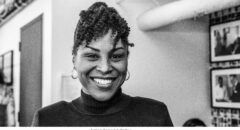 Susan L. Taylor, the beautiful, flawless face of Essence Magazine for 25 years was synonymous with beauty, intelligence, grace and even as some may describe now, "black girl magic" before the term was ever thought of. Susan was the editorial director of Essence for six years, and before that was editor-in-chief for 19 years. In her monthly column, “In the Spirit,” she used the platform to speak to millions of black women on a personal level. And her message to all was simple: “Love yourself.”
Susan L. Taylor, the beautiful, flawless face of Essence Magazine for 25 years was synonymous with beauty, intelligence, grace and even as some may describe now, "black girl magic" before the term was ever thought of. Susan was the editorial director of Essence for six years, and before that was editor-in-chief for 19 years. In her monthly column, “In the Spirit,” she used the platform to speak to millions of black women on a personal level. And her message to all was simple: “Love yourself.”
But little did the general public know that the now 74-year-old Taylor's journey success and self-love, was filled with her own personal struggle: a deep-rooted depression that crippled her as a child and continued into adulthood, even while being the face of Essence.
“I began spiraling downward, downward, downward and further and further into a depression that I couldn’t pull myself out of,” says the former executive.
“I felt like everything coming out of my mouth was incorrect. I’m out there speaking in front of thousands of people with a smile pasted on my face but dying on the inside."
Depression affects between 17-20 million Americans a year. Data from a study published by the Center for Disease Control (CDC) found that women (4 percent vs. 2.7 percent of men) and African-Americans (4 percent) are significantly more likely to report major depression than whites (3.1 percent).
 But the CDC also finds that just 7.6 percent of African-Americans sought treatment for depression compared to 13.6 percent of the general population in 2011. Fear, embarrassment and the stigma in the Black community against counseling (outside of the church, that is) keep many of us who actually need professional services from seeking them.
But the CDC also finds that just 7.6 percent of African-Americans sought treatment for depression compared to 13.6 percent of the general population in 2011. Fear, embarrassment and the stigma in the Black community against counseling (outside of the church, that is) keep many of us who actually need professional services from seeking them.
Writer and former colleague of Taylor's, Linda Villanova sums it up best: "Success can come with a price. We’re the first to arrive and the last to leave as we grind through 10-hour work days. We’re the ones everybody relies on—first at work, then after hours during the second shift of home and family time. We work ourselves almost literally 'to death' especially now during this economic storm. Or for some of us, we 'feel' like we have to continue to be the 'superwoman.'”
“My sadness and depression came out of giving myself to my career before I would give myself to myself,” says Taylor. “Everything for Essence; nothing for me.”
How many mothers, caregivers, guardians...
... and other unsung everyday heroes can identify with that? Putting everyone first...except yourself. It has to change.
“My mother was really depressed all of my life, and I thought it had to do with me,” she says. “So one day my uncle straightened me out. He said, ‘Susan, it’s not you. Babs has been depressed since she was a little child. So don’t take it personally.’ That was clarifying and also liberating.”
“I sought help, and everything began to unfold,” Taylor continues. “Hiding sadness makes you more and more sad because it closes you off to your healing. Giving voice to what you’re feeling is part of the healing.”
The organization that Susan now heads is all about transparency and giving voice to the next generation through real-life mentoring.
Founded by Taylor in 2005 as Essence CARES, in the wake of Hurricane Katrina, today the National CARES Mentoring Movement is a community-mobilization movement dedicated to healing and advancing our nation’s most defenseless children, our African American young trapped in a cycle of intergenerational poverty. In 58 U.S. cities, CARES affiliates recruit, train and connect adults to local youth-serving organizations desperate for Black volunteers. Additionally, National CARES is building for scaling and replication, transformational group-mentoring programs focused on the emotional, social and academic development of struggling children in our country’s most under-resourced schools. In January, 2008, Taylor left Essence magazine after 27 years as chief editor to work full-time with community leaders in mounting what has become the largest mentoring movement in the nation’s history and the only organization providing mentoring, healing and wellness services on a national scale for Black children.
“Mentoring is all about caring,” Taylor said. “It’s caring enough to spend one hour a week to advise and guide a vulnerable young person. None of the forces claiming our children’s lives are more powerful than our commitment and love. We are the solution.”
According to its mission, the National CARES Mentoring Movement seeks to end the struggles of Black America by connecting concerned adults with mentoring opportunities across the nation. Individuals are asked to volunteer at least an hour a week for a year to guide and encourage challenged youngsters in one-to-one or group mentoring relationships, where several adults spend time with a larger number of children.
"With mentoring I see light shining at the end of a long dark tunnel," explains Taylor. "There is a chance that if I devote more time and space in my life to learning and working with the growing number of community leaders throughout the nation who are organizing local Cares mentoring efforts, such a movement will succeed in doing what political will and public policy have not done: give our children in peril a chance to develop the extraordinary in themselves."









